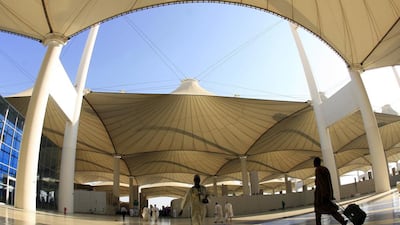Saudi Arabia should use the public-private partnership (PPP) model to overhaul more of its airports following the successful completion of the new Medina airport earlier this year, according to BMI Research.
The consultant has said the further use of PPPs “would yield much-needed investment and provide relief for a government that is under budgetary pressure”.
It added the success of the new, US$1.2 billion Prince Mohammed bin Abdulaziz International Airport terminal, which was officially opened in July, meant that a model is already in place to allow for an overhaul of the kingdom’s outdated airports.
The terminal was built by a consortium between Saudi contracting companies Al Rajhi and Saudi Oger alongside the Turkish contractor TAV under a build, own and operate agreement for 25 years until 2037.
“The Saudi Arabian airport sector has been – and will continue to be – an area of investment focus,” BMI Research said, due to the facilities being much older than regional peers in Qatar and the UAE, and that many are already running at capacity.
A new airport is also being built at Jeddah which will have a private operator, Aeroports de Paris, but has been built using government cash.
Maarten Wolfs, Middle East project and infrastructure finance leader at PwC, said that governments across the GCC were already adapting to lower oil prices by prioritising their project pipeline and postponing non-essential work.
He said that governments have two options for funding infrastructure – tapping up bond markets, as both Saudi Arabia and Oman have recently done, or bringing in private finance.
Chris Seymour, head of Middle East markets at the building consultancy Arcadis, said that Saudi Arabia currently has the fastest “reserve absorption rate” of any GCC country – ie it is burning through its cash reserves more quickly than other states as a result of the declining oil price.
He added that the kingdom’s “liquid reserves” – assets that it can cash in quickly – could be largely exhausted by 2018 if current spending rates continue.
“The government needs to consider other vehicles to maintain the infrastructure improvements necessary in what is the largest market in the GCC,” said Mr Seymour.
“PPP is thus one of those options and its use is becoming more widespread in Oman, Kuwait and Egypt.
“KSA has been relatively slow to consider this option, but it does provide a method of borrowing from the private sector while also achieving significant risk transfer in a project environment,” he added.
Saudi Arabia has also facilitated partially privately financed deals in the power and water sectors by agreeing to buy utilities at a fixed price from a private developer who can then recoup funds over the lifespan of a plant’s operation, but Mr Wolfs said that PPPs cannot be created without a solid legal framework in place guaranteeing investors’ rights.
“All countries who have adopted this have had to create new primary regulations to roll out PPPs,” he said.
Mr Wolfs said that PPPs could also be used to help the kingdom deliver ambitious social infrastructure programmes in health care and education – both of which have initiatives worth tens of billions of dollars where projects have suffered from stop-start funding regimes.
Indeed, the BMI Research report warned that for financiers, Saudi Arabia “remains a relatively risky market in which to develop and operate infrastructure” when compared with regional peers such as the UAE and Qatar.
“Operationally, there remain a number of systemic risks such as the Saudisation policy, which has generally increased the red tape and costs associated with employment regulations. That said, with buoyant demand and government support for the industry, airports offer some of the lower risk project opportunities in the market.”
mfahy@thenational.ae
Follow The National's Business section on Twitter


